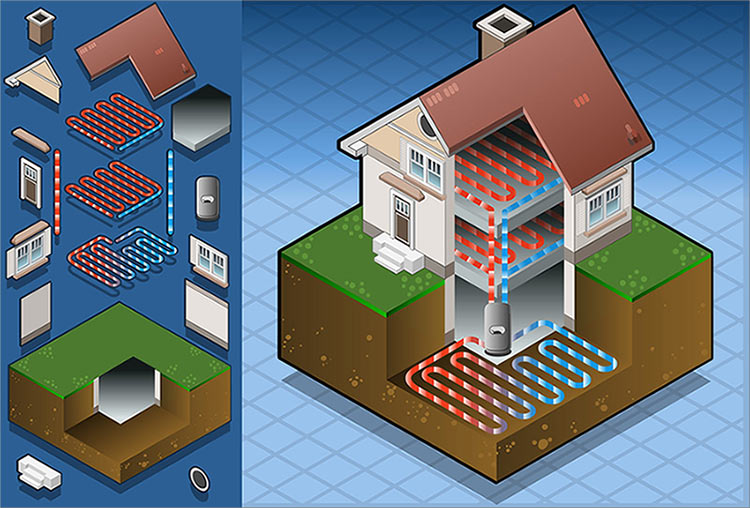January 23, 2023
How Does A Geothermal Heat Pump Work?

Geothermal heat pump systems are becoming an attractive option for homeowners who want to replace or update their current heating and cooling systems.
Our NC heating and air conditioning company has served Raleigh and Garner area clients for years. Recently, we’ve seen an increase in North Carolina homeowners who want to replace their outdated furnaces or old air conditioning systems with an energy-efficient option that keeps their homes comfortable year-round.
The solution to local residents’ heating and cooling systems needs is to install a ground loop system heat pump.
If you’re considering a new way to heat and cool your home that will save you money, reduce your carbon footprint, and maintain appropriate temperatures no matter the time of year, Bowman Mechanical Services is happy to share how geothermal heating and cooling systems work so you can determine if they are the best HVAC system solution for your home.

How Geothermal Systems Work
While air temperatures fluctuate constantly, the ground temperature at five to eight feet below the surface stays a consistent 55 to 60 degrees, which is much higher than average in the winter and definitely cooler than average in summer.
Ground source heat pumps rely on thermal energy that extracts this surface heat from the ground, processes it through an underground geothermal loop, transfers the heat into your home through a duct system, and then uses the energy to heat your home. Alternatively, the geothermal HVAC system works to exchange heat from the home back into the earth to generate geothermal cooling.
This entire ground source heat pump system uses renewable energy and is more energy-efficient and cost-efficient than conventional systems that burn fuel as their source of heat.
How Geothermal Heating Works
In the winter, the geothermal system works to draw heat from the ground and pump it into your home via the ground loop piping system. Heat is absorbed from within the earth where it then travels into your home and is dispersed and able to circulate through your home to warm it.
How Geothermal Air Conditioning Works
In the summer, the geothermal system pulls heat from the air in your home where it’s absorbed by temperature-conducting fluid that is continually flowing within a closed-loop system of pipes. The fluid absorbs the heat in your home, and travels down underground, allowing the heat to disperse with the ground acting as a heat sink before it travels back up into your home in a constant cycle.
Heat is continually transferred out of your home during cooling cycles keeping your home cool on even the hottest days.
Is a Geothermal Heating and Cooling System Right for Your Home?
It’s important to evaluate the needs of your house and family when choosing which HVAC is right for you.
When compared to traditional HVAC options like a furnace or other system, a geothermal system offers a few key benefits:
- Lower utility bills: Heating and cooling your home make up a large portion of your electric and gas bills, but a geothermal system offers incredibly low operating costs. Homeowners can see as much as a 50 percent reduction in their utility bills in the winter and summer, saving them thousands of dollars a year.
- Environmentally friendly: Because you’re not burning fuel or using large amounts of electricity, a geothermal heating and cooling system is sustainable and the best option for the environment of any other method of heating and cooling.
- Long-Lasting Equipment: While furnaces, air conditioners, and other heat pumps have a life span of around 10 years, geothermal systems have a very long life span. The pipes can be expected to last at least 50 years, while the rest of the equipment lasts between 20 to 25 years on average.
- Improves Home Value: When selling your home, having a geothermal heating and cooling system in place can make your home more attractive to potential buyers, and showing comps of your costs compared to surrounding neighbors can show the value of the system.
- Low Maintenance: There are no heat exchangers, pilot lights, flue pipes, or outdoor units to worry about, making them easy to maintain.
- Healthier for your home and the people in it: Geothermal units improve the air quality of your home, making it a more comfortable and livable space for anyone with allergies, asthma, or other breathing or health concerns.
While the initial installation costs for a geothermal heat pump system can be expensive, the long-term value and benefits make it an investment worth making for most homeowners.
Tax Incentives and Rebates for Installing Heat Pumps
When filing your income taxes, you will receive a tax credit for installing an energy-saving geothermal heat pump in your home. Fill out IRS Form 5695 for installing renewable energy equipment in your NC home. Local and federal governments are focused on finding ways to decrease the harmful use of greenhouse gases like fossil fuels that are burned when homeowners have furnaces or boilers. Therefore, homeowners who opt for environmentally friendly options like ground loop heating and cooling systems will receive tax incentives.
Disadvantages of Geothermal Heat Pumps
While the advantages of installing a thermal energy heat exchanger like a geothermal system far outweigh the disadvantages, it’s important to be fully informed on all the pros and cons whenever you are making a huge adjustment to any equipment in your home.
Some of the disadvantages of geothermal heat pumps are:
- High upfront costs: The installation costs for geothermal heat pump units can range between $18,000 to $30,000 for most homeowners, with higher-end units going as high as $45,000. While these upfront costs are higher than other conventional systems, the amount of money saved over the course of 3 to 5 years in energy savings will more than makeup for these early expenses.
- Landscape disruption: The installation process for geothermal heating and cooling systems involves extensive drilling and digging to build trenches and bury the underground pipes.
- Not a DIY project: Unfortunately, there is no way to DIY a geothermal heat pump installation. In order to transfer your home’s system off of natural gas or a unit that uses extensive electricity to operate, you will need to consult with a highly experienced geothermal heat pump expert to evaluate your home, assess your property’s landscape, and install your new ground source heat pump.
Get a Quote for Geothermal Heating and Cooling in Raleigh Today
Are you ready to convert your home’s outdated HVAC system into one that will offer savings, improved air quality, and benefits to the environment? If you’d like to learn more about this innovative, energy-efficient system that transfers heat to regulate the temperature of your home, we can help.

